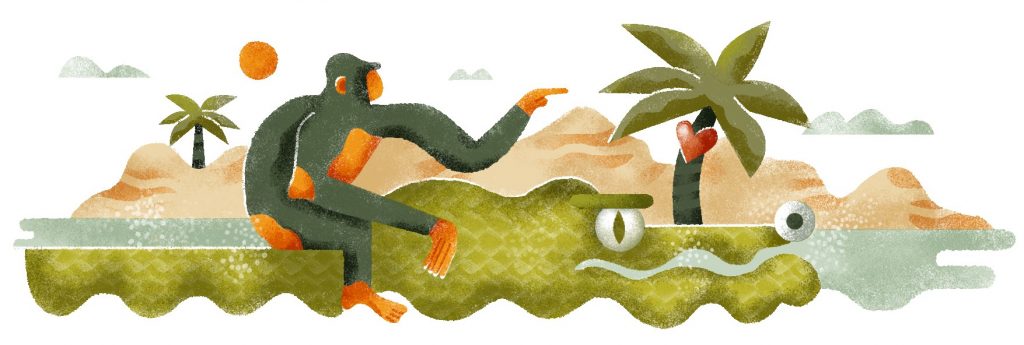समुत्पन्नेषु कार्येषु बुद्धिर् यस्य न हीयते ।
स एव दुर्गं तरति जलस्थो वानरो यथा ॥ १ ॥
samutpanneṣu kāryeṣu buddhir yasya na hīyate |
sa eva durgaṃ tarati jalastho vānaro yathā || 1 ||
He who keeps calm and uses his intelligence in troubled times, will be able to deal with any tough situation. Much like the monkey who was able to think his way out after being trapped in water.

Near a seashore, not so far away from here, lived a herd of monkeys, led by RaktaMukha (the one with a red face). As he had grown older, a younger, more aggressive monkey fought with him and drove him out of the herd. RaktaMukha started to live near a huge evergreen Jamun tree called MadhuGarbha (the one filled with nectar). This tree bore fruit all the year round, and so the monkey-in-exile spent his days eating these fruits and enjoying the cool breeze that came in from the sea.
One day, as he was eating, one of the jamuns fell into the water, with a splashing sound. RaktaMukha enjoyed this sound, and threw in a couple more, just to hear them splash. This became a daily habit.
It so happened that a crocodile named KarālaMukha (the one with an ugly face) was passing by at the same time. He began to catch these jamuns and eat them. RaktaMukha noticed this, and called out to the crocodile. “Sir! You have come this way for the first time, and so are my guest. Please enjoy these jamuns. It is said…
प्रियो वा यदि वा द्वेष्यो मूर्खो वा यदि पण्डितः ।
वैश्वदेवान्तम् आपन्नः सो ऽतिथिः स्वर्ग-सङ्क्रमः ॥ २ ॥
priyo vā yadi vā dveṣyo mūrkho vā yadi paṇḍitaḥ |
vaiśvadevāntam āpannaḥ so ‘tithiḥ svarga-saṅkramaḥ || 2 ||
Whether a friend or a foe, whether foolish or intelligent, a guest who arrives at your doorstep, is considered god-sent.
न पृच्छेच् चरणं गोत्रं न च विद्यां कुलं न च ।
अतिथिं वैश्वदेवान्ते श्राद्धे च मनुर् अब्रवीत् ॥ ३ ॥
na pṛcchec caraṇaṃ gotraṃ na ca vidyāṃ kulaṃ na ca |
atithiṃ vaiśvadevānte śrāddhe ca manur abravīt || 3 ||
One should not ask of his lineage or education, his family or reputation, but should merely welcome him, so say the wise.
दूर-मार्ग-श्रम-श्रान्तं वैश्वदेवान्तम् आगतम् ।
अतिथिं पूजयेद् यस् तु स याति परमां गतिम् ॥ ४ ॥
dūra-mārga-śrama-śrāntaṃ vaiśvadevāntam āgatam |
atithiṃ pūjayed yas tu sa yāti paramāṃ gatim
A person who takes good care of a guest who has arrived from far, and is tired, is always blessed and will always be at peace.
अपूजितो ऽतिथिर् यस्य गृहाद् याति विनिःश्वसन् ।
गच्छन्ति पितरस् तस्य विमुखाः सह दैवतैः ॥ ५ ॥
apūjito ‘tithir yasya gṛhād yāti viniḥśvasan |
gacchanti pitaras tasya vimukhāḥ saha daivataiḥ || 5 ||
If a guest goes away from the house, disappointed and sad, the gods and the ancestors of that family also turn their backs on that house.
KarālaMukha gladly accepted the jamuns, and ate them to his heart’s content. They then passed a lot of time discussing the matters of the world, and stories from their lives, and after a few hours, returned to their homes.
And so started the friendship of RaktaMukha and KarālaMukha. They spent a lot of time together, eating jamuns and conversing. Time flew in each other’s company, and so the monkey and the crocodile enjoyed spending their days together. KarālaMukha used to keep a few jamuns with himself, and take them home to his wife. This continued for a few months…
One day, the crocodile’s wife asked him “My dear, where do you get these juicy and sweet fruits from?”
KarālaMukha replied “My dear, I have a good friend – RaktaMukha the monkey. He picks the best jamuns and gives them to me, out of affection for me.”
“Someone who eats such sweet fruits everyday, will surely have a sweet heart”, said his wife. “If you think that I mean anything at all in your life, then bring that heart to me. I will eat it, and become free of the bonds of old age and death…we can then enjoy bliss for eternity.”
KarālaMukha looked shocked. “You shouldn’t speak that way”, he said. “RaktaMukha is like a brother to me, more than a brother in fact. He takes so much care of me, by feeding me sweet jamuns everyday. How can I kill him? Stop this stubbornness of yours. It is said…
एकं प्रसूयते माता द्वितीयं वाक् प्रसूयते ।
वाग्-जातम् अधिकं प्रोचुः सोदर्याद् अपि बान्धवात् ॥ ६ ॥
ekaṃ prasūyate mātā dvitīyaṃ vāk prasūyate |
vāg-jātam adhikaṃ procuḥ sodaryād api bāndhavāt || 6 ||
Brothers are of two kinds. One – born to the same mother. The second – born of words (promises of friendship). The wise say that the latter are more closer than even brothers related by blood.
The wife replied “You have never refused me before. I suspect that this is a female monkey. That is why you visit her every single day, and spend so much time with her. I have come to understand you now. Because…
साह्लादं वचनं प्रयच्छति न मे नो वाञ्छितं किञ्चन प्रायः प्रोच्छ्वसिषि द्रुतं हुतवह-ज्वाला समं रात्रिषु ।
कण्ठाश्लेष-परिग्रहे शिथिलता यन् नादराच् चुम्बसे तत् ते धूर्त हृदि स्थिता प्रियतमा काचिन् ममेवापरा ॥ ७ ॥
sāhlādaṃ vacanaṃ prayacchati na me no vāñchitaṃ kiñcana prāyaḥ procchvasiṣi drutaṃ hutavaha-jvālā samaṃ rātriṣu |
kaṇṭhāśleṣa-parigrahe śithilatā yan nādarāc cumbase tat te dhūrta hṛdi sthitā priyatamā kācin mamevāparā || 7 ||
You are not answering me joyfully, and you are not giving me what I want. At nights, you snore heavily, and you do not embrace and kiss me. O wicked one! There is another female in your heart!
KarālaMukha said…
Read the Panchatantra series लब्धप्रणाशं to know more!
